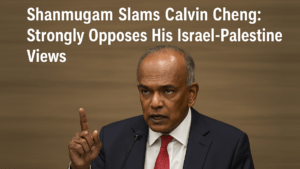Shanmugam Slams Calvin Cheng: Strongly Opposes His Israel-Palestine Views | Shocking Controversy Unfolds
Singapore’s Home Affairs and Law Minister, K Shanmugam, has firmly stated that his views on the Israel-Palestine conflict are significantly different from those of former Nominated Member of Parliament (NMP) Calvin Cheng. Addressing reporters on April 2, he reiterated his stance that Israel’s actions against Palestinians are “illegal and oppressive,” a position he first expressed in November 2023. His comments came amid backlash over a Facebook post by Cheng, who sarcastically suggested funding the relocation of a pro-Palestinian activist group to Gaza, sparking outrage, a police complaint, and legal threats.
On the same day, Foreign Affairs Minister Vivian Balakrishnan reported “unauthorized activity” on his Facebook account after a “like” appeared on Cheng’s post under his name, which he denied, prompting an investigation by Meta. In response to criticism, Cheng announced legal action against several individuals and platforms, including former opposition politicians and activists, whom he accused of defamation. He claimed to have sought advice from Senior Counsel and demanded public retractions and apologies from those involved.
The controversy has fueled intense public debate, highlighting differing perspectives on the Israel-Palestine issue within Singapore’s political and social circles. As legal proceedings unfold, the case continues to draw widespread attention and scrutiny.

Shanmugam Slams Calvin Cheng: Strongly Opposes His Israel-Palestine Views | Shocking Controversy Unfolds
Singapore’s Minister for Home Affairs and Law, K. Shanmugam, has clarified that his stance on the Israel-Palestine conflict is starkly different from the opinions expressed by former Nominated Member of Parliament (NMP) Calvin Cheng. This follows a heated debate sparked by Cheng’s controversial social media post, which has drawn public backlash, legal threats, and even unauthorized activity on a minister’s Facebook account.
Shanmugam’s Firm Stance
During a media interaction on April 2, Shanmugam addressed the ongoing controversy, emphasizing that his views on the conflict differ “very sharply” from Cheng’s. While acknowledging that Cheng frequently shares opinions on various issues, the minister stated that he does not follow all of Cheng’s posts and selectively agrees or disagrees with them. However, on the Israel-Palestine issue, Shanmugam reaffirmed his November 2023 position, condemning Israel’s actions as “illegal and oppressive” toward Palestinians, and confirmed that his stance remains unchanged.
Unauthorized Facebook Activity Involving Foreign Minister
In a related development, Foreign Affairs Minister Vivian Balakrishnan reported suspicious activity on his Facebook account to Meta (Facebook’s parent company) after an automated “like” appeared on Cheng’s contentious post dated March 13, 2025. Balakrishnan swiftly denied endorsing the post, clarifying in a public statement: “I did not ‘like’ Calvin Cheng’s post… I do not share those views.” He also highlighted that he has taken additional security measures for his account. Meta is investigating the incident, raising concerns about digital security and the integrity of public officials’ social media accounts.
Cheng’s Post Triggers Legal Backlash
The controversy centers on a March 13 Facebook post by Calvin Cheng, a former NMP and political commentator. In it, Cheng criticized “Monday of Palestine Solidarity,” a group accused of disrupting Meet-the-People Sessions (community outreach events organized by Singaporean lawmakers). Sarcastically, Cheng offered to sponsor the group’s relocation to Gaza, including business-class flights for leaders and walking shoes for supporters, on the condition that they never return to Singapore.
The post faced immediate backlash, with critics accusing Cheng of promoting Islamophobia. A police report was filed against him, alleging that his comments targeted the Muslim community. In response, Cheng announced defamation lawsuits against several individuals and platforms, including former Singapore Democratic Party chairman Jufrie Mahmood, Reform Party leader Kenneth Jeyaretnam, activist Martyn See, and online outlet The Online Citizen. These parties had either criticized Cheng’s post or republished allegations against him.
Cheng claimed that legal advice from a Senior Counsel confirmed the statements against him were “highly defamatory.” His lawyers have demanded public retractions and apologies from the accused. The situation remains fluid, with potential implications for free speech, racial harmony, and online accountability in Singapore.
Broader Implications
This incident underscores Singapore’s delicate balance between free expression and social cohesion. As a multiracial society, the city-state has strict laws against hate speech and religious incitement. Cheng’s post—and the polarized reactions—highlight the sensitivities surrounding discussions of global conflicts in a local context.
Meanwhile, the unauthorized “like” on Balakrishnan’s account raises concerns about cybersecurity for public officials. While Meta investigates, the incident serves as a reminder of the risks of digital impersonation and misinformation.
Ongoing Developments
As legal proceedings unfold, observers are watching closely to see how Singapore’s judiciary navigates claims of defamation versus the right to critique public commentary. Cheng’s legal actions could set precedents for how online speech is regulated, particularly when it intersects with issues of race and religion.
For now, Shanmugam’s reaffirmation of his position signals the government’s cautious approach to the Israel-Palestine issue, prioritizing diplomatic neutrality while addressing domestic sensitivities. The saga also reflects broader societal debates on responsible speech in an increasingly interconnected—and polarized—digital world.
You must be logged in to post a comment.